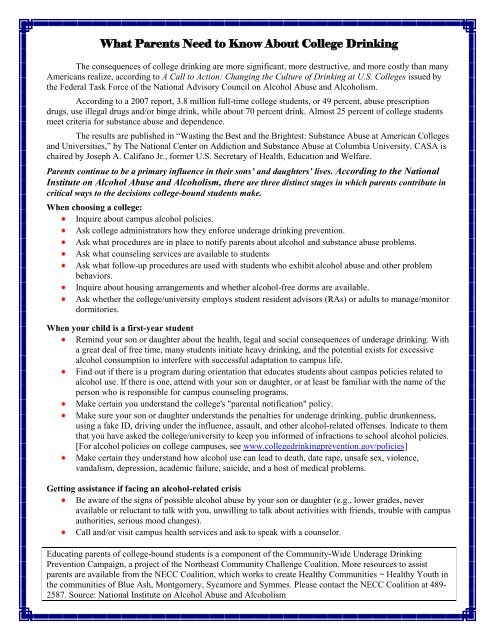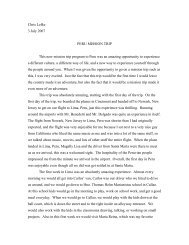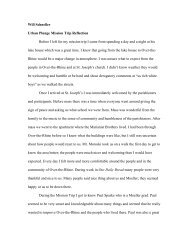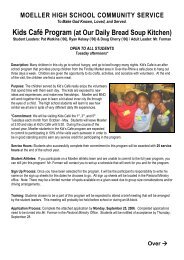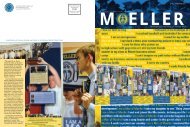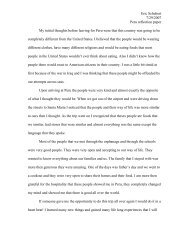june 2009 (printable) - Login - Archbishop Moeller High School
june 2009 (printable) - Login - Archbishop Moeller High School
june 2009 (printable) - Login - Archbishop Moeller High School
Create successful ePaper yourself
Turn your PDF publications into a flip-book with our unique Google optimized e-Paper software.
What Parents Need to Know About College DrinkingThe consequences of college drinking are more significant, more destructive, and more costly than manyAmericans realize, according to A Call to Action: Changing the Culture of Drinking at U.S. Colleges issued bythe Federal Task Force of the National Advisory Council on Alcohol Abuse and Alcoholism.According to a 2007 report, 3.8 million full-time college students, or 49 percent, abuse prescriptiondrugs, use illegal drugs and/or binge drink, while about 70 percent drink. Almost 25 percent of college studentsmeet criteria for substance abuse and dependence.The results are published in “Wasting the Best and the Brightest: Substance Abuse at American Collegesand Universities,” by The National Center on Addiction and Substance Abuse at Columbia University. CASA ischaired by Joseph A. Califano Jr., former U.S. Secretary of Health, Education and Welfare.Parents continue to be a primary influence in their sons’ and daughters’ lives. According to the NationalInstitute on Alcohol Abuse and Alcoholism, there are three distinct stages in which parents contribute incritical ways to the decisions college-bound students make.When choosing a college:Inquire about campus alcohol policies.Ask college administrators how they enforce underage drinking prevention.Ask what procedures are in place to notify parents about alcohol and substance abuse problems.Ask what counseling services are available to studentsAsk what follow-up procedures are used with students who exhibit alcohol abuse and other problembehaviors.Inquire about housing arrangements and whether alcohol-free dorms are available.Ask whether the college/university employs student resident advisors (RAs) or adults to manage/monitordormitories.When your child is a first-year studentRemind your son or daughter about the health, legal and social consequences of underage drinking. Witha great deal of free time, many students initiate heavy drinking, and the potential exists for excessivealcohol consumption to interfere with successful adaptation to campus life.Find out if there is a program during orientation that educates students about campus policies related toalcohol use. If there is one, attend with your son or daughter, or at least be familiar with the name of theperson who is responsible for campus counseling programs.Make certain you understand the college's "parental notification" policy.Make sure your son or daughter understands the penalties for underage drinking, public drunkenness,using a fake ID, driving under the influence, assault, and other alcohol-related offenses. Indicate to themthat you have asked the college/university to keep you informed of infractions to school alcohol policies.[For alcohol policies on college campuses, see www.collegedrinkingprevention.gov/policies]Make certain they understand how alcohol use can lead to death, date rape, unsafe sex, violence,vandalism, depression, academic failure, suicide, and a host of medical problems.Getting assistance if facing an alcohol-related crisisBe aware of the signs of possible alcohol abuse by your son or daughter (e.g., lower grades, neveravailable or reluctant to talk with you, unwilling to talk about activities with friends, trouble with campusauthorities, serious mood changes).Call and/or visit campus health services and ask to speak with a counselor.Educating parents of college-bound students is a component of the Community-Wide Underage DrinkingPrevention Campaign, a project of the Northeast Community Challenge Coalition. More resources to assistparents are available from the NECC Coalition, which works to create Healthy Communities ~ Healthy Youth inthe communities of Blue Ash, Montgomery, Sycamore and Symmes. Please contact the NECC Coalition at 489-2587. Source: National Institute on Alcohol Abuse and Alcoholism


